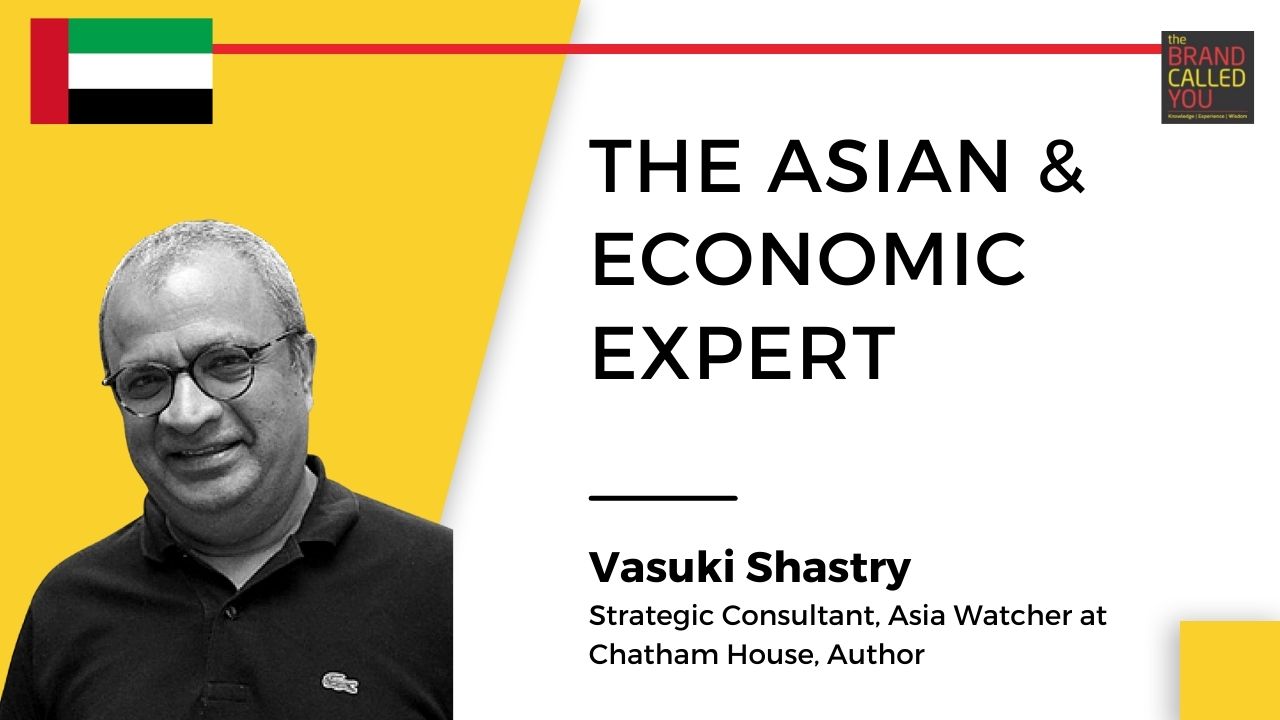Vasuki Shastry, Strategic Consultant, Asia Watcher at Chatham House, Author
Vasuki Shastry is an associate fellow of the Asia-Pacific programme and was most recently global head of public affairs and sustainability at Standard Chartered Bank.
Podcast
Overview
Our guest for this episode of The Brand Called You, Vasuki Shastry, is an expert on the subjects of Asian countries and economies. He is a strategic consultant and an Asia watcher at Chatham House. He has been an economic and political journalist in India, Singapore and Jakarta. He has worked for the International Monetary Fund. He is an author and has written several books. One of his books, ‘Has Asia Lost It?’ was a finalist at the American Book Fest Awards 2021. He also is the commissioner of the Commonwealth War Graves Commission.
Chatham House and Vasuki’s role there
Asia Pacific Program Chatham House is a renowned international think tank. Its headquarters are in the UK. The Asia Pacific Program looks at very broad economic, social, technological, and political issues of different countries. Vasuki is one of the think tanks there. He adds that countries like India, China, and Indonesia are at their front and center.
Vasuki tells us that he has been an Asia watcher through his career by virtue of being a journalist in Southeast Asia. Then when he worked with the Singapore Central Bank and the Standard Chartered Bank, he got to work extensively in the economic field. So being a think tank at this program is the collective essence of his career.
What has been the effect of the pandemic on the economies of China, India, and Indonesia?
In Vasuki’s opinion, a fair comparison of the state of the economy would be a comparison between Asia and the western countries. He says that every country was deeply affected by the COVID lockdown. However, Asian countries have shown relatively better economic results during this time than the advanced west.
Talking about the Indian economic situation, Vasuki says that if we keep 2020 as the base year, India has performed pretty well in the year 2021.
Discussing China, Vasuki says that even though the economic growth is slow, it is still positive in the country.
According to him, this COVID situation has taught a very important lesson to countries that they have to build social resilience during a crisis.
China and Power
According to Vasuki, China, under its President Xi Jinping, believes that its time in history has come. This is why we see assertiveness coming from them not just in the form of border tensions, but also in the South China sea.
A Chinese leader, about three or four decades ago had said that until the time is right, China should bide its time and bury its head and focus on economic development. According to Vasuki, that strategy has worked pretty well for China. However, the difficulty with China is its assertiveness in making claims that could probably be resolved through negotiation. These actions from China contribute to losing its goodwill for a generation in India and other parts of the world.
How is India being perceived economically around the world?
In Vasuki’s opinion, people around the world see India as the land of very complex socio-political dynamics, which for a period of time was able to demonstrate the power of economic reforms. However, this example of India is less these days. He believes that both the past and the current government had an opportunity to reset India, but they failed to do it.
Vasuki says that when India was showing an 8% economic growth during the 2000s and 2010s, there was a great sense of complacency within the country and the government that one can’t postpone the necessary economic reforms. He talks about how the implementation of GST was necessary to regulate indirect taxes and was introduced in the country. He believes that economic reforms are difficult when the economy is slow which in his opinion is India’s problem for the past decade. Observing all this situation, Vasuki has concluded that India does its best at the time of the Crisis. India has certainly done economically well during the pandemic. He believes that India has a high potential, but it is somehow snatching defeat from the jaws of victory. There is tremendous scope for India economically if it uncages its potential.
Profile
Vasuki Shastry is an associate fellow of the Asia-Pacific programme and was most recently global head of public affairs and sustainability at Standard Chartered Bank.
Early in his career, Shastry was an economic and political journalist in India, Singapore, and Indonesia. After leaving journalism in 1998, he worked for the International Monetary Fund in senior communication roles including Asia Pacific spokesperson, head of internal communications, and global head of public affairs.
Shastry also worked for the Singapore central bank, where he established the communications department. His research areas include Asia-Pacific economic and financial integration, technology and public policy, global governance, and sustainable finance.
Shastry is the author of Resurgent Indonesia – From Crisis to Confidence, published in 2018, and was recently appointed to serve as Commissioner of the Commonwealth War Graves Commission (CWGC).


